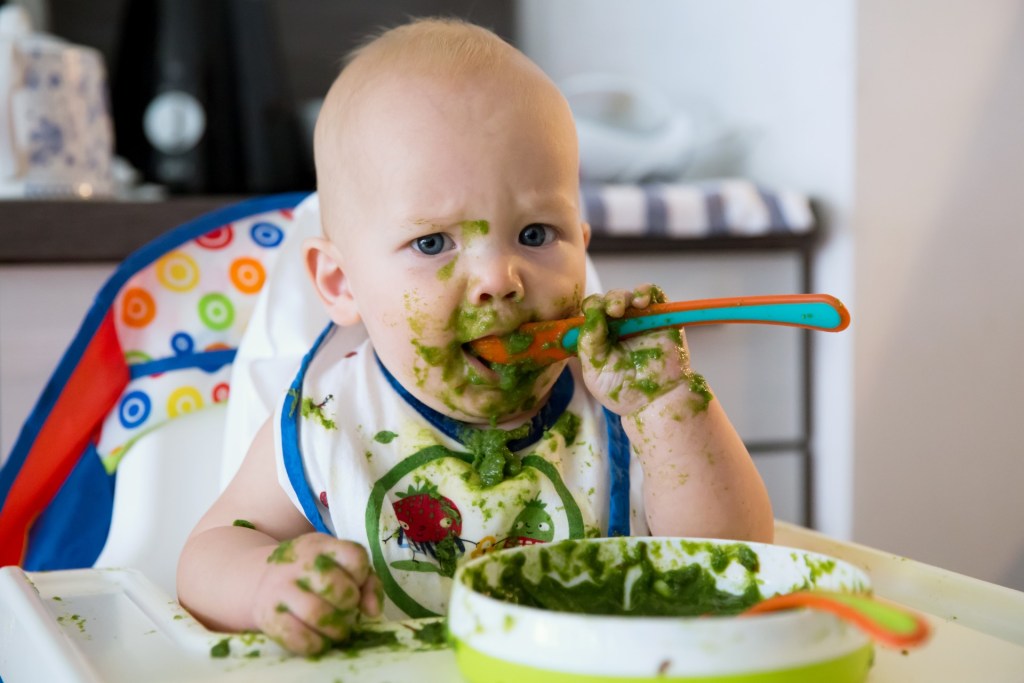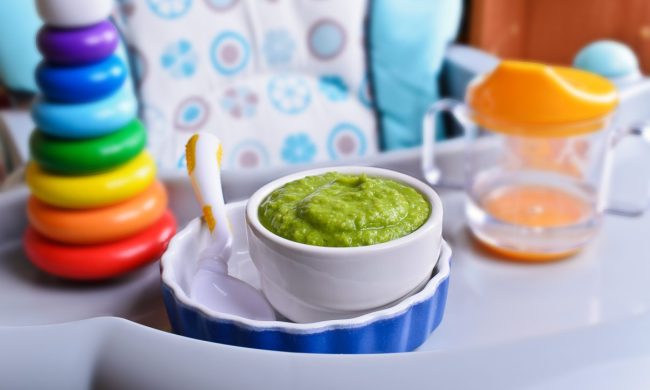Mealtime is your family’s chance to relax and connect in new ways. For babies, it’s a time to try different things and broaden their ever-expanding taste palette. We know letting your child play with their food may sound messy, and sure, some food chunks might end up on the floor on the wall, but trust us, it’s worth it. So let’s take a closer look at these benefits we’re talking about.

It fosters adventurous taste buds
A child playing with food sounds like a recipe for disaster, but during mealtime, it’s a whole new learning experience. Research has shown that when children have the opportunity to explore their food and control how they eat, they’ll be less likely to become picky eaters.
Even if your little one just squishes, mashes, or throws that piece of broccoli, they’re still getting used to its look, feel, and smell. Pretty soon, they’ll be nibbling on it and then eating whole florets. To avoid waste, give them tiny bits of many different things you’re also eating. Don’t be afraid of spices and seasoning, so long as it’s nothing wild like ghost or habanero peppers.
Offer other foods with interesting shapes and textures like whole-wheat, rainbow rotini pasta, and vegetables cut into stars. For babies, eating is not only about taste and smell, it’s also about sight and feel.
It helps them learn self-feeding
Infants and toddlers can barely pick up a ball without dropping it a million times first, so don’t be surprised if their meal etiquette is a little rough around the edges. In their quest to bring food to their mouth, they’ll miss and leave globs of food on their cheek, chest, hair, and everywhere else instead. Bottom line: They’re getting invaluable experience on how to feed themselves.
In time, they’ll be experts at picking up tiny food without wasting a single crumb.
You might introduce utensils around 10 months old and beyond, though toddlers will most likely just wave them around or mash their food. Again, totally acceptable. As long as they have plenty of opportunity to practice, they’ll learn in no time.
Place a washable liner on the floor around the splash zone to avoid stains. Also look into long-sleeve bibs to save on paper towels.
It takes the stress off mealtime expectations
Walk away from ambitious expectations about what you want your baby to eat, how much, and when. The truth is, children will eat what they need. They also eat and explore at their own pace, and the most we can do is offer them a healthy plate. The rest is up to them.
When you let your child play with their food at mealtime, you’re creating a pressure-free environment where you and your little one can relax. We know being a first-time parent means constantly thinking about every aspect of your child’s health, and we totally get it! If you’re concerned about nutrient deficiencies, there may be other ways to address it besides stressing over mealtime. We suggest avoiding jumping to conclusions and consulting your pediatrician instead. Older children can take gummy vitamins or other supplements in case they’re really skimping out on food.
It gives you time to eat, too
And the best part about letting your child play with their food during mealtime? It leaves you free to enjoy your food while your little one is having fun. Many parents often miss out on this sacred time if they’re spoon-feeding their little one or goading bits of food into reluctant mouths.
The dishes and other chores can wait while you eat an actual, warm meal during mealtime and not hours after everything has settled down. No more powering through hangry moods, settling for cold meals, or relying solely on caffeine! Your mind and body will thank you for it.
Mealtime is a wonderful time to reconnect with your baby and yourself. Letting your child play with their food gives them the chance to practice self-feeding, try new flavors, and eliminate food-related pressure. The secret is to let loose, lower your expectations, and enjoy the ride. It really is that simple, and in the end you will have raised a fiercely independent, adventurous eater.

If you’re looking for more food-related topics which concern your kids, read on further to learn how to stop food obsession in children.


